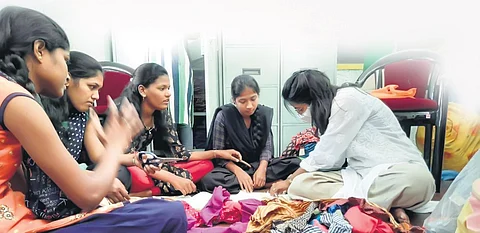

The fashion industry is massively responsible for greenhouse gas emissions, depletion of non-renewable sources, etc., and is trying every trick in the book to reduce its carbon footprint. It was on witnessing this “dark side of fashion” that Swati Soharia (33) from East of Kailash, decided it was time to take a stand. The 2011 graduate in knitwear design from National Institute of Fashion Technology, Delhi shares, “In 2016, I took a pledge that I won’t shop for a year. That was the genesis of Katran.”
Talking about her initiative, Katran—an upcycling studio with a five-member team—she says, “After 2016, since I took the pledge, I started upcycling my own clothes and also did this for family members. That garnered a lot of attention. That is when I started getting orders; people would come with their bag of old clothes and I would upcycle it for them. I hired my first set of tailors.” While it started as a “customer A to customer A business model”, Soharia later scaled it up to work with pre-consumer waste from export houses, local tailors, design colleges, etc., to make accessories, home décor objects, bags, saris, and stoles. “There is so much textile waste that even fashion designers reach out to us.”
Making a difference
Talk to Soharia and the one thing she stresses on is “frugal design”. We ask her to elaborate on what that would constitute and she replies, “Frugal design is basically ‘jugaad’ [translates to being resourceful]. The idea is to find solutions instead of finding problems.” Mentioning the fabrics and textiles they work with, Soharia mentions, “Upcyclers cannot be choosers; we have to work with the waste that we receive. If polyester fabric and other such fabrics [that are not biodegradable] come to us, we use it as it should so it does not have to go to the landfill. If we will not use it, then who will? ”
Building communities that thrive
An unsaid belief in this industry, mentions Soharia, is that women cannot be good tailors. “This was a challenge I took upon myself; I wanted to break that bubble,” she adds. One of the main objectives of Katran, therefore, is to provide employment to women from economically vulnerable and marginalised communities. Through her network, she was able to reach out to clusters across the country, “We have an ongoing project in two clusters [10 women each] in Kashmir where we are doing Crewel work on fabric with Sozni and Tilla; there are about four to five clusters in Maharashtra, here we make accessories using Paithani sari waste and other crafts from the region; one in Hosur, Tamil Nadu; and of course, in and around Delhi.”
The team recently completed a project with the Short Stay Home—a temporary shelter for the needy women and girls in distress—of the Tihar Jail happening at the Nirmal Chhaya Complex, which is a statutory protective and corrective institution. Stressing on the fact that Katran works on collaboration, she concludes, “The responsibility is shared because nobody can reinvent the wheel; my business relies a lot on collaboration. We partner with a lot of NGOs, corporate partners, people who are promoting the work, and this is how Katran survives.”